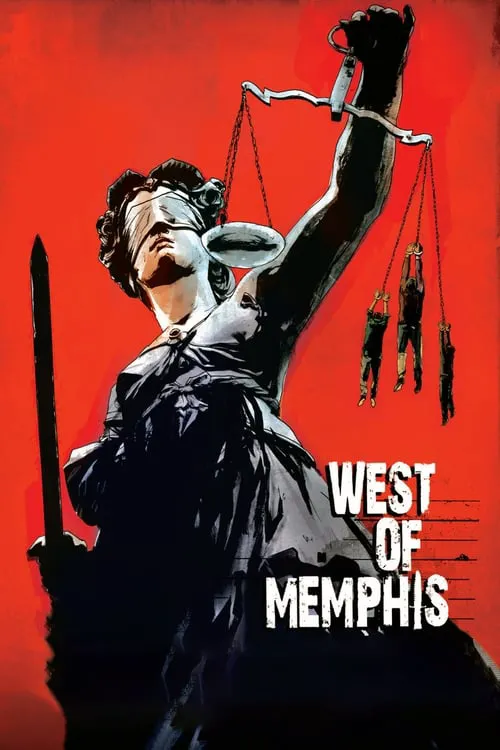West of Memphis

Plot
In the depths of West Memphis, a small town nestled in the heart of the American South, a gruesome triple homicide shook the community to its core. The brutal murders of three young boys, Stevie Branch, Michael Moore, and Christopher Byers, unfolded on a fateful evening of May 5, 1993, as 8-year-old boys played in the woods near their homes. The senseless slaughter sent a wave of horror and despair rippling through the town, prompting an investigation that would become one of the most infamous in Arkansas' history. The case caught the attention of a trio of outsiders, Damien Echols, Jason Baldwin, and Jessie Misskelley, who were all in their early teens at the time. Damien, a self-proclaimed outsider with a fascination for black metal music and occult literature, was seen as an easy target for suspicion, given his unconventional interests and rebellious demeanor. Meanwhile, Jessie, a socially awkward and intellectually disabled teenager, was questioned by police multiple times, despite his family's warnings that he was vulnerable to manipulation. Jason, a quiet and reserved teenager, was initially cleared as a suspect, only to be linked to the crime through dubious connections to Damien. As the investigation progressed, police discovered a small, handwritten notebook belonging to Damien, which contained cryptic references to ritualistic practices and symbols reminiscent of satanic cults. The discovery sealed Damien's fate as a suspect, and the police launched a relentless campaign to build a case against him and his cohorts. Enter Ron Lax, a local investigator and Damien's family friend, who would become instrumental in unraveling the complex web of evidence and exposing the flaws in the prosecution's case. Ron's tireless efforts, coupled with the help of two young lawyers, Dan Stidham and Val Price, formed the core of the defense team. Throughout the documentary "West of Memphis," Ron Lax shares intimate details about the inner workings of the defense, revealing an investigation that was marked by mistakes, oversights, and a general disregard for the truth. Lax points out the discrepancies in the prosecution's timeline, highlighting how crucial evidence, such as the presence of blood on Damien's hands, seemed to vanish when subjected to rigorous scrutiny. In stark contrast, the prosecution, led by the relentless Marcia Mills, relied heavily on questionable testimony from Damien's co-defendants and the coerced statement of Jessie Misskelley, which contradicted the facts in a way that defied logic. As the documentary shows, Lax's painstaking research and forensic analysis exposed a litany of errors and inconsistencies in the prosecution's case, raising serious questions about the reliability of the evidence. In 1994, Damien Echols, Jason Baldwin, and Jessie Misskelley were convicted of first-degree murder and sentenced to life in prison. But the convictions were not the end of the story; rather, they marked the beginning of an arduous appeals process that would span over a decade. Dan Stidham and Val Price led the appeals effort, armed with a wealth of new evidence and expert testimony that challenged the prosecution's claims. They also worked closely with private investigator Ron Lax, who became an integral part of the team. In 2005, a new investigation into the DNA evidence revealed a stunning reversal. It turned out that the DNA analysis had been conducted incorrectly, and when re-examined using new techniques, the results pointed to an alternative suspect: Terry Hobbs, a 38-year-old neighbor of the victims who had a history of violent behavior. In the summer of 1993, Terry Hobbs had reported that Damien had been seen near the crime scene, but this testimony was later retracted. Furthermore, several eyewitnesses came forward claiming to have seen Terry near the scene of the crime on the night of the murders. In light of this new evidence, in 2007, Jason Baldwin and Damien Echols' convictions were vacated, allowing them to be released on parole. Jessie Misskelley's conviction remained in place, but his release was secured several years later in 2011, after Arkansas Governor Mike Beebe commuted his sentence. The "West of Memphis" documentary presents an exhaustive, meticulous, and deeply disturbing account of a case that continues to haunt the American South. By following the true accounts of those who lived it, the filmmakers deliver an unprecedented look into the inner workings of the defense, exposing the systemic failures and flaws that led to the wrongful convictions of three innocent men. As the story of Damien, Jason, and Jessie unfolds, the documentary raises fundamental questions about justice, truth, and the darker aspects of the human psyche. "West of Memphis" is a gut-wrenching testament to the enduring power of resilience, as the families of the victims and the wrongly accused fight for justice, seeking closure and vindication in the face of unspeakable tragedy. Ultimately, the film serves as a scathing indictment of a system that can be crippled by the weight of flawed evidence, tunnel-visioned thinking, and an overzealous pursuit of sensationalist justice. It also highlights the crucial role of a vigilant defense team, comprised of dedicated advocates who refuse to surrender in the face of overwhelming odds.
Reviews
Recommendations



